The 10 commandments of Erasmus in Bremen: transport
Second commandment: "you will love the Semesterticket more than anything else"
Hi! After various articles about my travels, I'm returning to write about Erasmus life in Bremen, on this occasion, I will be talking about how to move around the city and its surroundings.
If you have ever been to any big German cities such as Berlin or Hamburg, you would have notices that the public transport is usually divided into buses, trams, U-Bahn and S-Bahn. Don't ask me what the difference between the last two is, because although in theory, the first is the underground subway and the second runs above ground up by bridges on top of the city, in practice, the two travel underground and come back overground into the city in a matter of 2 stops. However, Bremen is not a big city (it has 500, 000 inhabitants), so the transport in the city is based on trams and buses, also I use a bicycle.
One of the first things that you will have to do on arrival in Bremen will be to pay a series of student fees to complete your inscription or enrolment as a student or an exchange student. In total, these fees amount to 229. 76€, of which 155. 76€ will pay for your Semesterticket, whereas the rest are used for school insurance and other stuff.
The Semesterticket is a card which, as its name suggests, is valid during the whole semester and allows you to get public transport throughout Bremen for free. Taking into account that each one way ticket on the tram or bus costs 2. 70€ (1. 40€ if the journey is less than 3 stops), the savings after 6 months of staying in Bremen are fairly high. Also, using your Semesterticket makes life easier, seeing as you can get on and off public transport without having to show anything: you only have to show it when getting on a night bus or when a ticket inspector asks you for it, something that rarely happens. For me, they have only asked to see my Semesterticket twice since I arrived at the end of September, so you can imagine the lack of ticket inspectors.
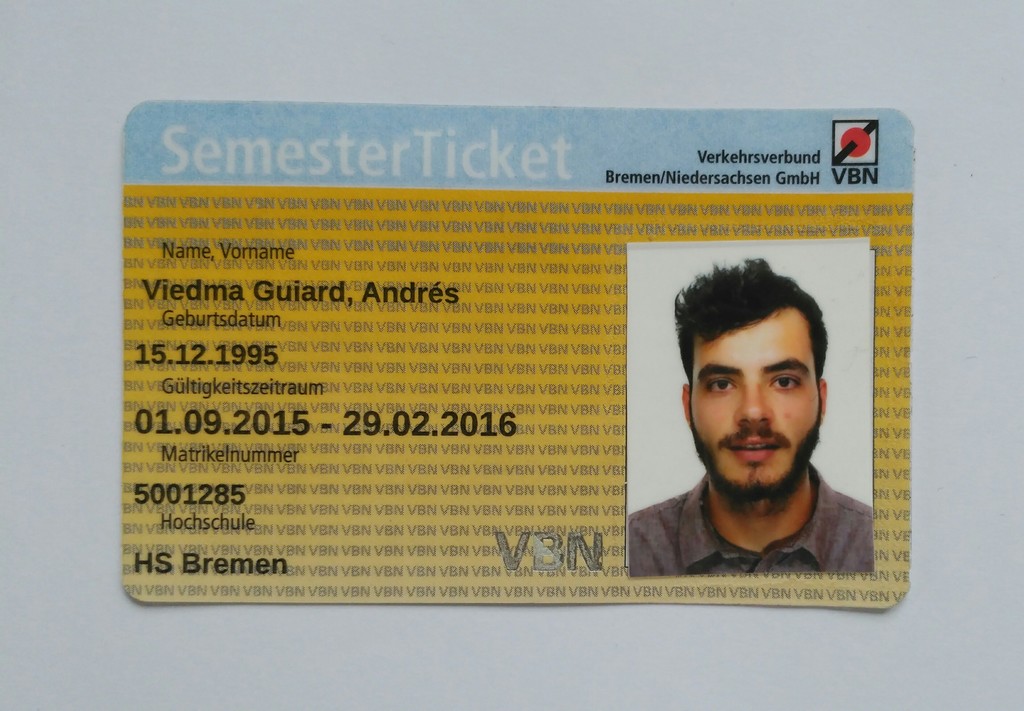
But the best thing about the Semesterticket is this: as well as public transport in the city, it allows you to get a large number of regional trains which go to cities like Hamburg, Hannover, Bremerhaven and Osnabrück, for free, as well as an infinite number of little towns and nature areas, such as the coast of the North Sea. Below, you can see a map which shows you all of the railways which you can get with this card. Nevertheless, you should know that the high speed trains are not included in the Semesterticket (IC, ICE and EC trains), but there is still a high number of trains that you can get (for example, there's one every hour to Hannover or Hamburg).
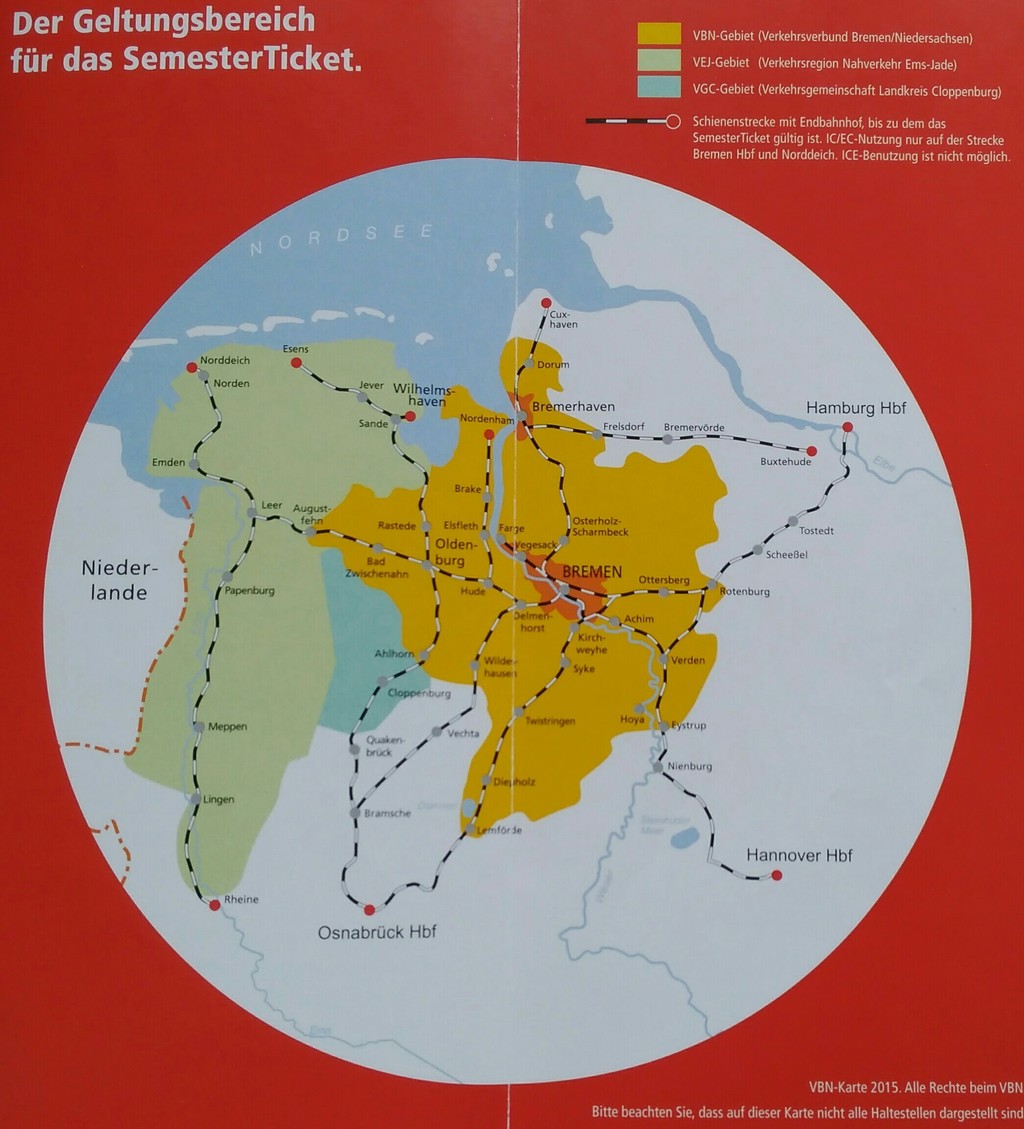
I recommend that you really take advantage of your Semesterticket, seeing as once you've paid for it, you might as well use it to do touristy things throughout the whole region, especially because the distances are fairly short (all the train journeys are less than an hour and a half). My flatmates and I go on these "free excursions" from time to time, because you can spend the whole day doing touristy things without spending anything.
As for the transport inside the city, I would recommend that you download the app that is used a lot to make life easier in Bremen: the Fahrplaner app. This app lets you find out about stations and departure and arrival times, whilst calculating all the possible connections for you. Also, it tells you when the trams or buses are delayed and it includes the option to look at a map which shows the journey you will have to take, something which is fairly useful during the first few days. As well as working with the public transport network in Bremen, it works with the whole German railway network, so you will be able to check the journey between the tram stop by your house to the main train station in Cologne or Munich, for example.
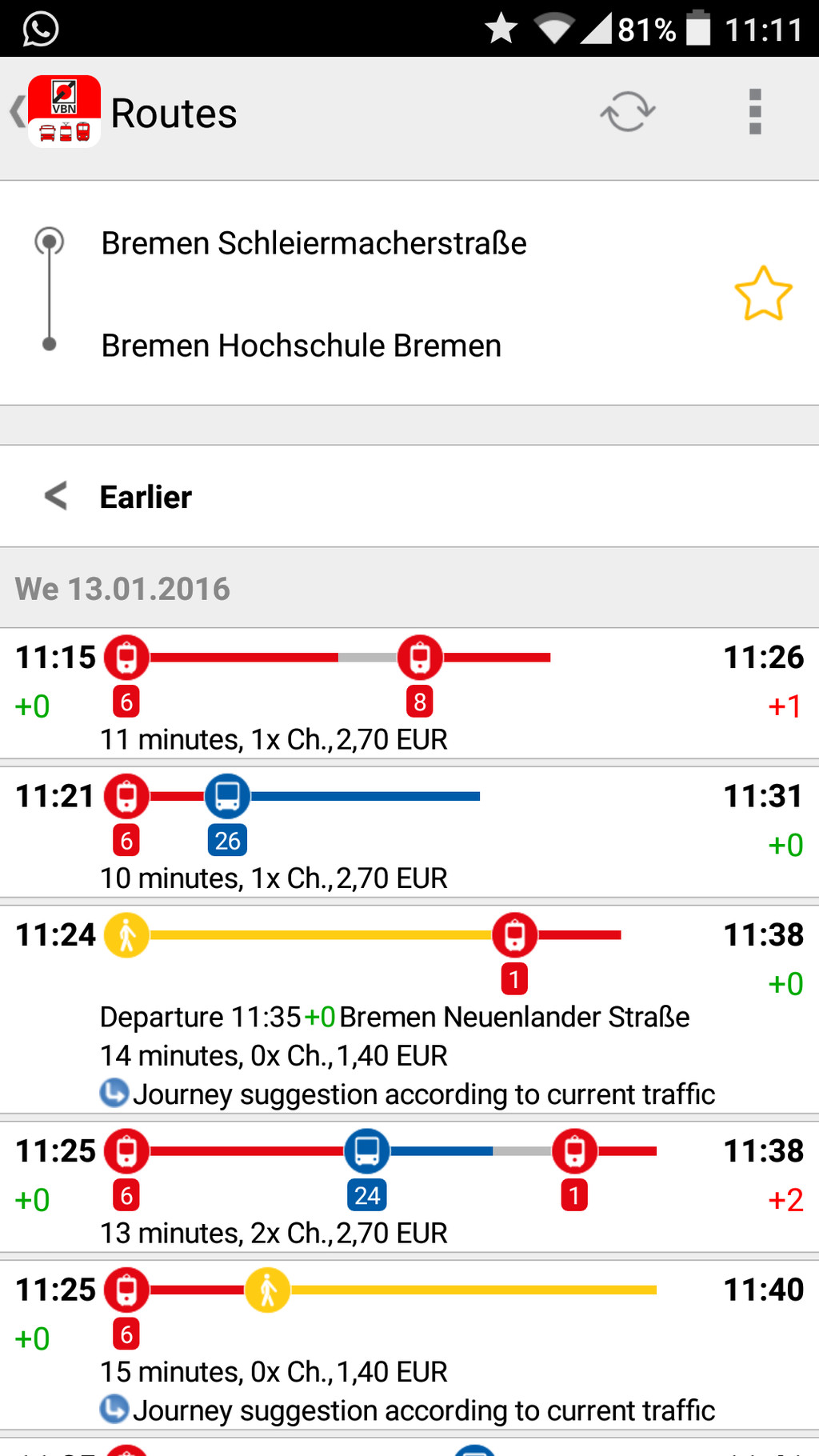
In regards to how well the public transport system works, I have to say that even though the German stereotype of punctuality and precision is not as true as we thought, it is true that in general the system works better than the Spanish public transport system. The frequency of the trams and buses is fairly good during the day, with a tram coming every 10 minutes or less during peak times and every 20 minutes during off-peak times.
As for the night service, there are around 2 or 3 trams throughout the night during the week and a fair few more on Fridays and Saturdays, which complicates the nightlife a little in respect to my city, Murcia. To have to depend on the tram or the bus to come back home from a party means that you have to know beforehand the exact times during the night that you can catch a form of public transport, and when the time comes, you have to quickly decide if it's worth staying at the party for another hour or two, or not. In any case, if you are an expert "night-owl", I have to say that at 5-5:30, the trams start running again, so you will most likely find yourself coming home on the tram surrounded by German workers holding their morning cups of hot coffee.
In general, the public transport system works quite well, but if you like to get around, there will come a time when you get tired of having to always get the tram or bus to places, and you will miss moving around a little by foot. To get from place to place in Bremen is relatively quick if you live close to the city centre, (in my case, it takes between half an hour and forty minutes to walk to the main station, and about ten minutes less to walk to the cathedral), but the weather during winter will make you not want to walk anywhere. This leaves us with the last option to get around the city, it's probably the most German method of them all: the bicycle.
The bicycle, largely ignored by the Spanish government until not too long ago, comes as a great support on the part of the German leaders. Practically every street has a cycle path (they actually have two, one going in each direction) and so many drivers and pedestrians alike really respect the cyclists, they're practically the kings of traffic. A little while after completing "Anmeldung" (inscription or registration of residency in a town) the local government send you a welcome brochure which offers you pamphlets and information of interest, such as this giant map of bike lanes in the city, where you can see the large number of bike paths that there are.
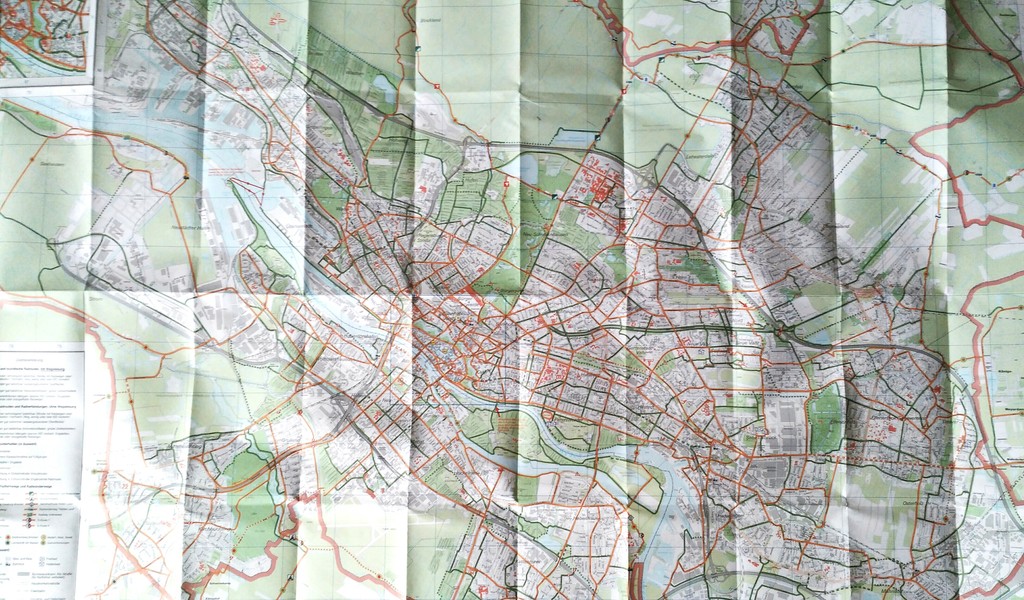
When you arrive in Bremen, you will spend a period of time adapting where you will be tutted at by like, 10 bicycles a day, for invading the bike lanes, which you won't realise you have invaded. Furthermore, you're going to see that not only young people use bikes, but people of all ages and occupations use bikes on the daily as a means of transport.
I actually decided to buy a bike so I could exercise more and so I wasn't always getting around on the tram. As an exchange student, the most logical thing to do is buy a second hand bike and then try and sell it on when you have to leave. I went to Flohmarkt (a second hand market) which is held every Sunday in the morning in Hansa-Carré. I found a bike for 45€ and a lock for 7€, both of which I will try to sell on for 50€ when I have to go back to Spain in July, so I had spent 4. 5€ a month for 10 months of having a bike (that's a good deal, right? )
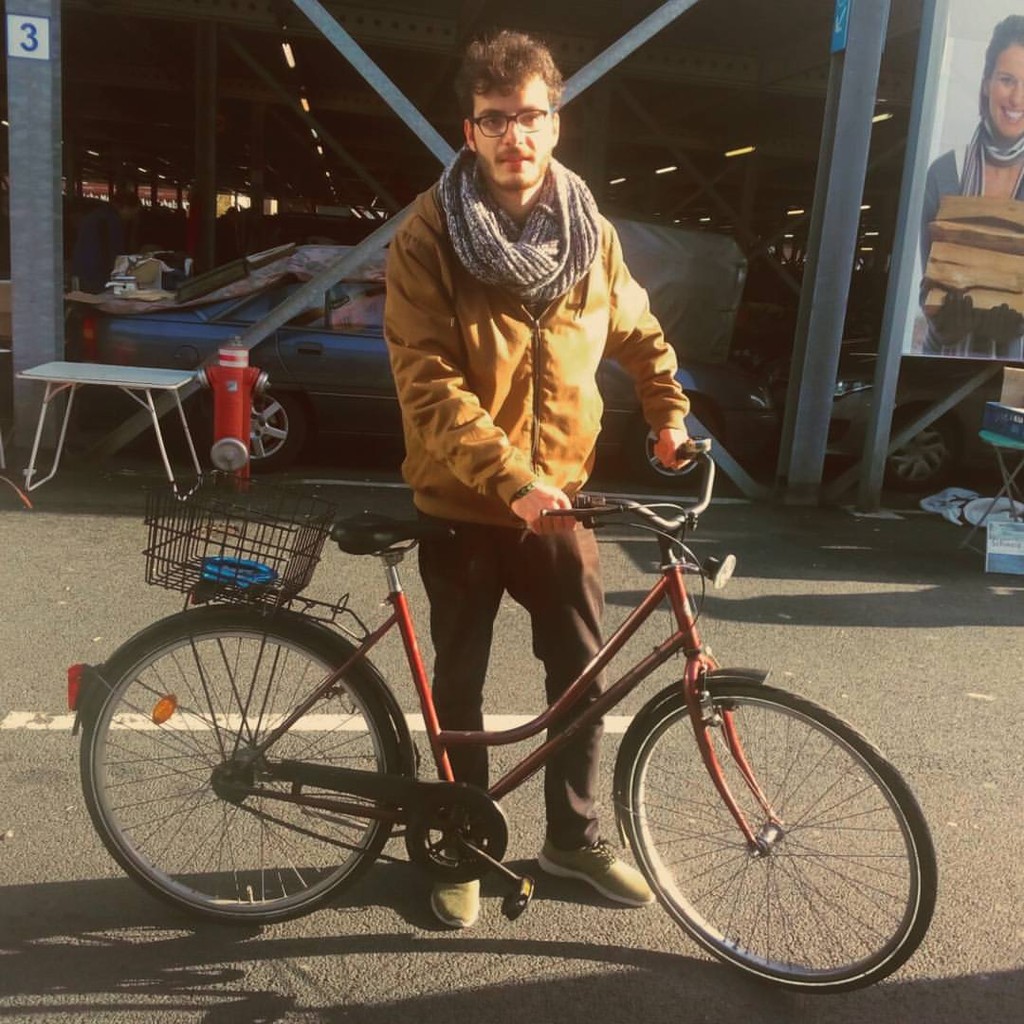
However, if you're time in Bremen is going to be only for one semester in winter and you're coming from a hot and dry country, like mine, then buying a bike won't really be worth the money, since from beginning of December until the end of February, the cold, the rain and the snow will make you decide not to take your bike to go anywhere but instead to catch the tram so you can warm yourself up (you can see my bike covered in snow). I used my bike a fair amount during autumn, coming and going on my bike in the rain and temperatures of 2ºC, but during the last weeks before Christmas, I stopped cycling, a little bit because I would lose my nose to frostbite. Nevertheless, I know for certain that when the temperature starts going up again, the bike will be key in enjoying the good weather and the big parks and promenades in Bremen.

I hope all this information and advice has helped in regards to what you're going to experience in Bremen.
Auf wiederlesen!
Photo gallery
Content available in other languages
Want to have your own Erasmus blog?
If you are experiencing living abroad, you're an avid traveller or want to promote the city where you live... create your own blog and share your adventures!
I want to create my Erasmus blog! →





















Comments (0 comments)